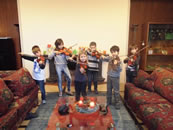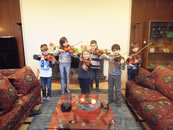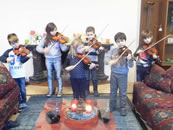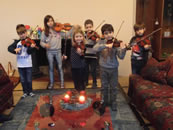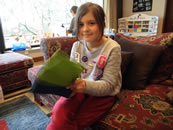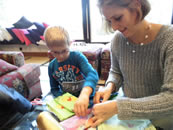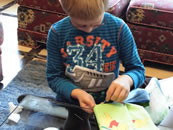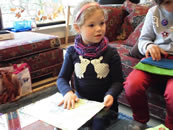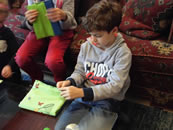Extracurricular Activities
Extracurricular is offered from 12:15 until 13:15 is designed to be provided year round. Many of the extracurricular activities can be chosen freely by the pupils depending on their inclinations and interests.
There are developmental opportunities for language and mathematics which may be made compulsory for selected pupils when necessary. Some extracurricular activities are led by external specialists. The activities on offer will vary throughout the year.
Aim of extracurricular activities:
- To expand interests
- To discover talents
- To develop and strengthen interests and skills
- To provide pupils the opportunity for intense and beneficial contact with children from all school years
- To provide the learning conditions for greater learning successes
Our Extracurricular Activities
This is primarily for our youngest pupils and provides opportunities to develop fine motor skills and creativity.
The choir practises with our choir leader to aid preparation for different events throughout the year: pupil enrolment, the Christmas concert, for the Open Days that we host or also for external events to which we as a school are invited.
The pupils build upon previous knowledge in the Computer extracurricular club, and learn the basics as well as acquiring key skills. The following are the principle aims:
- Handling the mouse, keyboard, printer and further hardware
- The basics of using Windows and the menu functions
- The basics of word processors (Word), spreadsheets (Excel), simple design software (Publisher) and presentations (PowerPoint)
- How to install hardware and software and the basics of the operating system
- How to remain safe when using the internet and how to operate search engines
The conditions and requirements of the pupils will be monitored. The objectives will be attained through:
- Learning games and interactive learning methods
- Specialised software
- Group work with the computers
- Role play and strategy games, correct for the corresponding ages
The children have the opportunity to play instruments, including those which they bring from home, and further their development together. All musical strengths are accommodated.
The children learn how to play the flute using sheet music.
In the fourth class the children can learn French. Their contact with the language begins with games and by encountering day to day situations.
The most famous and widespread team sport in the world provides opportunity for your child to learn different skills such as ball skills, technique and tactics. If numbers allow, there will be separate female and male teams running side by side.
Children will learn how to properly care for flowers and the various use of plants. Most important is that the correct attitude and awareness of our living environment is learnt.
Children of all ages often have the need to joust with one another and test their strength. This is a part of life for boys as well as girls and is important for psychological, social and physical development, but becomes a problem when skills, knowledge and attitudes as well as opportunities are missing. Challenging one another within a fair, controlled and responsible format helps to develop this.
The intensive bodily contact of the martial arts will also aid the improvement of tactile, kinaesthetic, the sense of balance and further the range of muscular movements. Sensing a range of emotions from the partner, - including fear, competitiveness and worry – will develop empathy. The holistic development of physicality, emotion and cognition, will improve bodily expression in relation to the environment. The education gleaned through Judo is worthwhile for boys and girls in both the Lower and Secondary schools.
The aim of the Judo extracurricular club is the awarding of the first belts available in Judo, (white-green belt) through official belt examinations (every child receives a certificate as verification that would be recognised in all registered clubs).
Children have the opportunity to read a variety of different books, depending on their own requirements. With Antolin (a web based programme for the development of reading within schools) children can test their understanding of a book with online quizzes. During reading time, films of the books that all children are reading together will also be showed. By comparing films and books, different interpretations will become clear.
The club is offered to children interested in mathematics. Numbers allow us to understand the world: combinations, estimations, discovery, comparisons and representations. A playful journey through mathematics with illuminating numbers, models and effects. The goal of the club is to achieve a positive attitude towards maths.
In this extracurricular club creativity, coordination and colour theory will be trained. The children will be introduced to famous artists and their works. The pupils present their work from a position of their choice. An important component is also the experience of how a deeply concentrated production can be a relaxing enterprise.
With Fischertechnik (a brand of construction toy used in education) pupils learn the principles of physics. MINT (Maths, Computing, Science and Technology) is a concept that we are putting into for the lower school, due to it being beneficial to have prior knowledge of the subjects before the onset of the secondary education. Experiments and phenomena ready the children for the basics in a fun way, developing the interest in maths, science and technology.
We regularly hold chess tournaments against other schools. Learning and playing chess involves educational values and sporting aspects. Chess promotes skills such as concentration, logic, clarity and imagination. The sporting aspects of chess involve the basic principles of performance: following rules, competition, playing to a time limit, and tolerance. The teaching of chess follows the basic lessons: - the Pawn’s moves – the Rook’s moves – the Knight’s moves – the Bishop’s moves - Check with two towers – the moves of the Queen - castling - counterattack, etc. After practicing different units, students can earn their Springer and Bauern diplomas.
In the basement of the International School of Life, the children can play the drums.
All rules and guidelines of sports included on the curriculum will be taught and discussed in the course of the school year in the Sport AG.
With a computer-aided language program, children from the second grade can choose a language they would like to learn in addition to English and German. This language is practised for half a year with a combination of computer programmes and short audio films. For the second half of the year, the International School of Life is trying to get a language assistant from each respective country to the school. In this manner each child can learn, practice and deepen understanding during this semester with the language assistant, through intensive contact to the language.
Animals are kept on the grounds of the International School of Life. This gives the children a chance to know and love animals as fellow creatures. Observing the growth of animals, as well as handling and caring for them, develops a connection with the animals of our world.
Children learn table tennis. Fast reactions and coordination are promoted.









